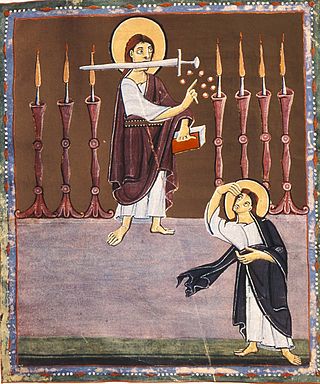The Apostles' Creed, sometimes titled the Apostolic Creed or the Symbol of the Apostles, is a Christian creed or "symbol of faith".
To be born again, or to experience the new birth, is a phrase, particularly in evangelicalism, that refers to a "spiritual rebirth", or a regeneration of the human spirit. In contrast to one's physical birth, being "born again" is distinctly and separately caused by the operation of the Holy Spirit, and it occurs when one is baptized in water. It is a core doctrine of the denominations of the Anabaptist, Moravian, Methodist, Baptist, Plymouth Brethren and Pentecostal Churches along with all other evangelical Christian denominations. All of these Churches strongly believe Jesus's words in the Gospels: "You must be born again before you can see, or enter, the Kingdom of Heaven". Their doctrines also mandate that to be both "born again" and "saved", one must have a personal and intimate relationship with Jesus Christ.

Christ, used by Christians as both a name and a title, unambiguously refers to Jesus. It is also used as a title, in the reciprocal usage "Christ Jesus", meaning "the Messiah Jesus" or "Jesus the Anointed", and independently as "the Christ". The Pauline epistles, the earliest texts of the New Testament, often call Jesus "Christ Jesus" or just "Christ".

Two names and a variety of titles are used to refer to Jesus in the New Testament. In Christianity, the two names Jesus and Emmanuel that refer to Jesus in the New Testament have salvific attributes. After the crucifixion of Jesus the early Church did not simply repeat his messages, but focused on him, proclaimed him, and tried to understand and explain his message. One element of the process of understanding and proclaiming Jesus was the attribution of titles to him. Some of the titles that were gradually used in the early Church and then appeared in the New Testament were adopted from the Jewish context of the age, while others were selected to refer to, and underscore the message, mission and teachings of Jesus. In time, some of these titles gathered significant Christological significance.
Christ the King is a title of Jesus in Christianity referring to the idea of the Kingdom of God where Christ is described as being seated at the right hand of God.

"Jesus wept" is a phrase famous for being the shortest verse in the King James Version of the Bible, as well as in many other translations. It is not the shortest in the original languages. The phrase is found in the Gospel of John, chapter 11, verse 35. Verse breaks—or versification—were introduced into the Greek text by Robert Estienne in 1551 in order to make the texts easier to cite and compare.
Jesus was a Jewish preacher and religious leader who most Christians believe to be the incarnation of God and Muslims believe was a prophet.
God the Son is the second person of the Trinity in Christian theology. The doctrine of the Trinity identifies the Logos (Jesus) as the incarnation of God. United in essence (consubstantial), but distinct in person with regard to God the Father and God the Holy Spirit.
Hosanna is a liturgical word in Judaism and Christianity. In Judaism it refers to a cry expressing an appeal for divine help. In Christianity it is used as a cry of praise.
Salt of the earth is a phrase used by Jesus in the Sermon on the Mount, part of a discourse on salt and light.
A disciple is a follower and student of a mentor, teacher, or other figure. It can refer to:
Son of man is the translation of various Hebrew and Greek phrases used in the Hebrew Bible, various apocalyptic works of the intertestamental period, and in the Greek New Testament.

In Christianity, God is believed to be the eternal, supreme being who created and preserves all things. Christians believe in a monotheistic conception of God, which is both transcendent and immanent. Christian teachings on the transcendence, immanence, and involvement of God in the world and his love for humanity exclude the belief that God is of the same substance as the created universe but accept that God the Son assumed hypostatically united human nature, thus becoming man in a unique event known as "the Incarnation".

Light of the World is a phrase Jesus used to describe himself and his disciples in the New Testament. The phrase is recorded in the Gospels of Matthew (5:14–16) and John (8:12). It is closely related to the parables of Salt and Light and Lamp under a bushel, which also appear in Jesus' Sermon on the Mount.
This is a glossary of terms used in Christianity.
Word of God or God's Word may refer to:

The following outline is provided as an overview of and topical guide to Wikipedia articles on the life and influence of Jesus.

Son of man is an expression in the sayings of Jesus in Christian writings, including the Gospels, the Acts of the Apostles and the Book of Revelation. The meaning of the expression is controversial. Interpretation of the use of "the Son of man" in the New Testament has remained challenging and after 150 years of debate no consensus on the issue has emerged among scholars.
This page is based on this
Wikipedia article Text is available under the
CC BY-SA 4.0 license; additional terms may apply.
Images, videos and audio are available under their respective licenses.






